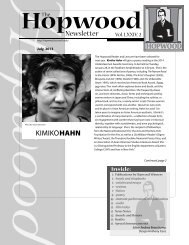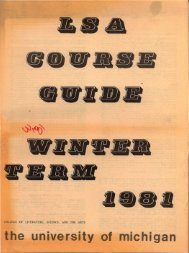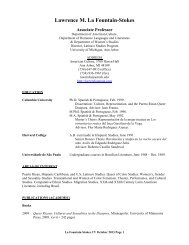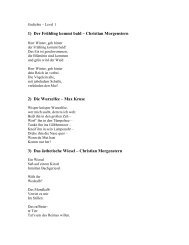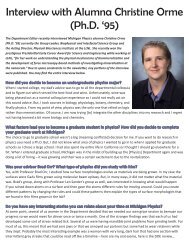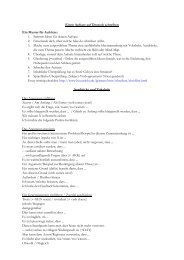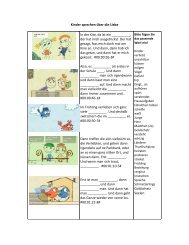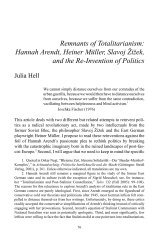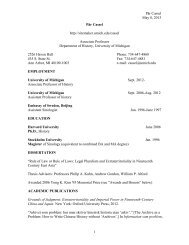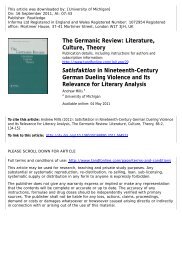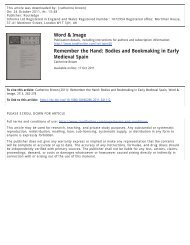Making History Personal: Constantine Cavafy and the Rise of Rome
Making History Personal: Constantine Cavafy and the Rise of Rome
Making History Personal: Constantine Cavafy and the Rise of Rome
Create successful ePaper yourself
Turn your PDF publications into a flip-book with our unique Google optimized e-Paper software.
Frier, “<strong>Making</strong> <strong>History</strong> <strong>Personal</strong>,” page 32<br />
form, <strong>and</strong> tone. 103 <strong>Cavafy</strong> once claimed that he was driven toward <strong>the</strong> past by “125 voices inside<br />
me telling me I could write history.” 104<br />
In his historical poems, we may surmise, <strong>Cavafy</strong> has lis-<br />
tened attentively to all <strong>the</strong>se clamoring voices, <strong>and</strong> has <strong>the</strong>n appropriated <strong>the</strong>m for himself <strong>and</strong><br />
his art. The past is not lost to us. The past is not alien, a foreign country; but only ourselves, if<br />
seen through different eyes. <strong>History</strong> lies, not behind us, but beside <strong>and</strong> before us, illuminating<br />
our pathways <strong>and</strong> guiding our footsteps forward. Still, it is very much our own responsibility to<br />
light this lamp in <strong>the</strong> first place, <strong>and</strong> to keep it always glowing.<br />
Conclusion: <strong>Making</strong> <strong>History</strong> <strong>Personal</strong><br />
There is substance to Robert Liddell’s observation that <strong>Cavafy</strong>’s “best historical poems<br />
are generally <strong>the</strong> re-creation <strong>of</strong> an atmosphere, or <strong>the</strong> poetical expansion <strong>of</strong> a character from a<br />
line or two <strong>of</strong> an ancient text, or a deduction from a face on a coin.” 105<br />
But this observation<br />
should not be understood ei<strong>the</strong>r as suggesting that <strong>Cavafy</strong>’s historical forays were mainly casual<br />
exercises, or as undermining <strong>the</strong> ultimate seriousness <strong>of</strong> his broader inquiry. On <strong>the</strong> contrary,<br />
<strong>Cavafy</strong>’s very perseverance, over decades, indicates <strong>the</strong> intensity <strong>of</strong> his concern.<br />
As I have suggested in this paper, <strong>Cavafy</strong>’s historical poems, taken individually, may<br />
perhaps best be viewed as <strong>the</strong> products <strong>of</strong> a fairly intense hermeneutical research program.<br />
Although he usually takes his sources pretty much at face value, he actively interrogates <strong>the</strong>m in<br />
<strong>the</strong> process <strong>of</strong> creating poetry. Only rarely does a poem slavishly follow its primary or second-<br />
ary source; almost always <strong>the</strong>re is a distinctive admixture <strong>of</strong> <strong>Cavafy</strong>’s own invention—<br />
something most obvious in poems like “Alex<strong>and</strong>rian Kings” (1912), where <strong>the</strong> deliberate confla-<br />
103<br />
This melding is put very well by Kalogeris, “Sensuous Archaism” (2009): “<strong>Cavafy</strong>’s great gift is for compressing<br />
historical narratives into dramatic monologues that illuminate a shifting epoch, or for getting at <strong>the</strong> obsessions<br />
(sexual, political, aes<strong>the</strong>tic) that drive a life in one implacable direction: both predicaments are viewed as traps<br />
set by <strong>the</strong> psyche or by <strong>the</strong> Parcae, <strong>and</strong> <strong>Cavafy</strong>’s tenderness is in his level, unwavering attention to <strong>the</strong> way that lives<br />
unfold <strong>and</strong> empires expire.”<br />
104<br />
Sachperoglou, Collected Poems (2007) xxv, quotes <strong>Cavafy</strong>’s self-commentary in Lechonites, ed.,<br />
Αυτοσχόλια (1977) 19-20: “I am a poietes historikos [historical poet or poet-historian]; I would never be able to<br />
write a novel or a play, but I feel 125 voices inside me telling me I could write history.” In a helpful footnote, Sachperoglou<br />
adds George Seferis’s comment: “I don’t think poietes historikos means a poet who also writes history or<br />
who versifies history; if <strong>the</strong> word ‘poet’ has any meaning at all, it means someone who possesses a historic sense.”<br />
105<br />
Liddell, <strong>Cavafy</strong> (1974) 125; compare Catsaouni, “<strong>Cavafy</strong>” (1983).<br />
106<br />
See Beaton, “<strong>History</strong> Man” (1983) 43: “… <strong>Cavafy</strong>’s historical poems are … <strong>the</strong> testimony to a rational confrontation<br />
between <strong>the</strong> creative imagination, whose sphere is <strong>the</strong> present moment, <strong>and</strong> <strong>the</strong> consciousness <strong>of</strong> <strong>the</strong> past<br />
as always beyond <strong>the</strong> reach <strong>of</strong> that moment.”<br />
106



